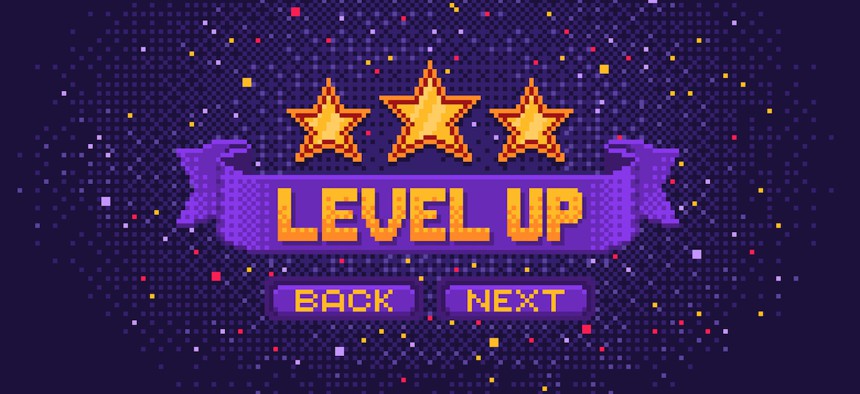Let's Play: How Games Can Improve Employee Learning

seamartini/Getty Images

Connecting state and local government leaders
COMMENTARY | Gamification or game-based learning is a great tactic in training employees on the skills and processes they need to know for their current positions and to encourage them to upskill for their next jobs.
JEOPARDY!®, Wheel of Fortune® and trivia may sound more like activities for a game night with friends than a government training program. And that’s exactly the point.
Government agencies are turning to gamification to make their learning and development programs more effective. State, local and international agencies, including the City of Fort Lauderdale and Santa Clara County Parks, along with the UN High Commission on Refugees, use gamification in training. The federal Office of Personnel Management recently selected one of seven prime contractors to its USALearning IDIQ in no small measure because of its expertise in game-based training.
Why? Because gamified training works. Employees lose 90% of what they learn passively—through reading or listening to a lecture—within a week. When they learn that same information actively, such as by competing in trivia or playing word games, they retain much more of it, upwards of 75-90%.
Playing games on the clock may feel strange to agencies responsible for keeping the government safe, productive and healthy. But gamification is a great tactic for helping employees learn, grow and thrive. Here’s why gamified training works and why it’s a particularly good fit for government employees.
Gamified Training Maximizes Engagement and Knowledge Retention
Gartner defines gamification as “the use of game mechanics and experience design to digitally engage and motivate people to achieve their goals.” Benjamin Franklin put it a bit more memorably: “Tell me and I forget, teach me and I may remember, involve me and I learn.”
Franklin likely didn’t anticipate how much harder learning would become as technology has increased the amount of information workers are bombarded with on a daily basis. If I spend 30 minutes on a Zoom call, I hang up to find 10 emails, 12 Slack messages and a few texts waiting for me. We’ve become overwhelmed by our need to react and respond to so many different forms of communication.
Attention is at a premium in this environment. As learning professionals, we have to fight for that attention—and games help us do that.
Games engage employees intellectually and emotionally, helping them forget about the messages piling up while they’re developing a new skill or brushing up on compliance regulations. The intellectual challenge of a game drives information deep into the brain. During play, learners create neural pathways that enable them to easily retrieve that information later.
That translates into results that help organizations achieve their goals. At one corporation, customer service agents who underwent game-based training reduced their average case-handling time by 12% and improved their rate of resolving issues within the first call by 8.5%.
Gamification Supports Long-Term Career Growth
I’ve spent most of my career helping organizations train their employees. When private companies look to improve their training, they’re often looking to improve employee retention—a daunting challenge, since average employee tenure in the private sector is only 3.7 years.
State and local government has a leg up on the private sector when it comes to tenure. I was floored to learn that employees stick around for 6.3 years in state government or 6.9 years in local government, nearly twice as long as in the private sector.
Game-based learning is a great way to support employees for the longer term, even over the course of an entire career. Government jobs are clearly defined, so learning and development solutions present material that match the skills required not just to employees’ current positions, but for upskilling so they can keep advancing.
Moreover, government employees must follow more comprehensive and meticulously detailed processes than in corporate America. When training people to execute operations correctly and repetitively, it’s easy for the training to become less emotionally engaging (aka, dull). Gamification makes learning more active and enjoyable, driving the necessary information home so employees can access it from day to day.
In short, game-based learning is a more effective way to train employees on the skills and processes they need to know for their current jobs and to encourage them to upskill for their next jobs.
Gamified Training Is Accessible and Scalable
Gaming is a cost-effective way to achieve both scale and personalization when training a large and diverse distributed workforce. As pandemic-era telework policies are coming to a close, plenty of state and local agencies still offer flexible work schedules. Effective learning programs meet employees where they are, both physically and in terms of capabilities, and bridge the gap between them in spite of their differences.
“Gaming” doesn’t necessarily mean high-tech play that’s only appropriate for Twitch-streaming Gen Z employees. Games can be played on a desktop computer or a mobile device, whatever employees prefer. They can also be replicated across different content formats to accommodate employees’ preferences and accessibility needs.
One local police department, for example, took its 35-page cybersecurity guidebook and turned it into a 3D game. Expecting and assuming officers would take the time to read and absorb the guide in its entirety wasn’t realistic. By gamifying the manual, the department increased officers’ engagement with the content, provided feedback immediately and leveled up their cybersecurity skills efficiently.
Agencies can also use games to foster community across a distributed workforce. Whether employees are competing or collaborating, team-based learning creates a genuine sense of teamwork and community that lasts long after the winner is announced.
Gamified training brings that sense of engagement, joy and accomplishment into an area of work that employees typically approach begrudgingly at best. Along the way, games also create a positive environment for learning, empowering organizations to achieve their training goals, improving employee performance—and succeeding in their missions.
Richard Lowenthal is chief operating officer at The Game Agency.
NEXT STORY: More States OK Postpartum Medicaid Coverage Beyond Two Months


